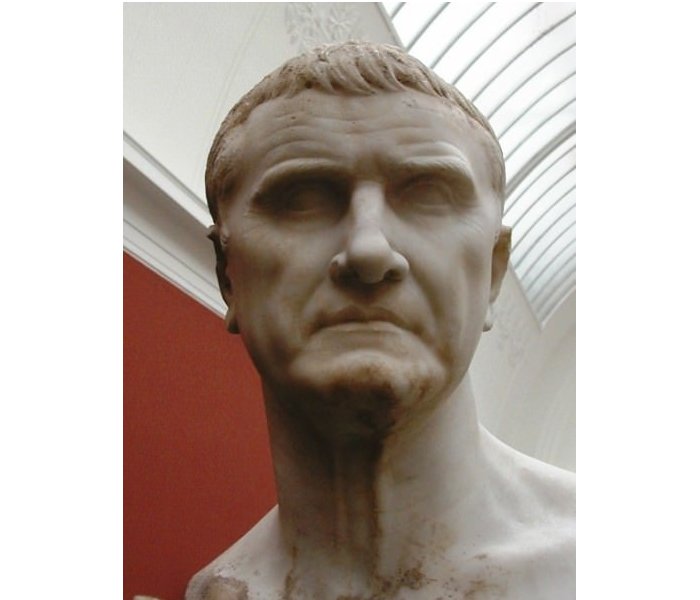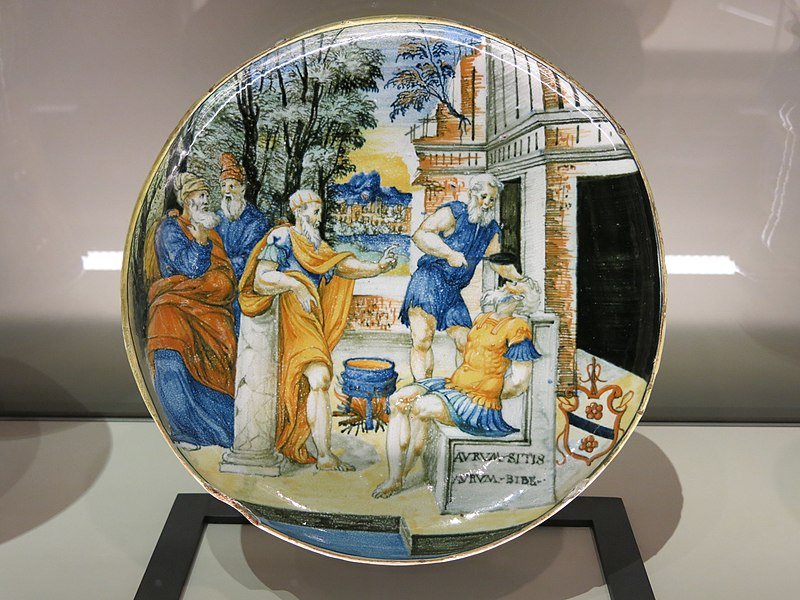Did Crassus, Ancient Rome’s Wealthiest Man Really Die From Drinking Molten Gold?
Ellen Lloyd - AncientPages.com - Marcus Licinius Crassus (c. 115 B.C. —53 BC.) was a Roman general and politician. Today, he is remembered as the wealthiest man in ancient Rome, suppressing the slave revolt led by Spartacus and forming the so-called First Triumvirate with Julius Caesar and Pompey to challenge the Senate's power effectively.
A bust of Roman statesman and general Marcus Licinius Crassus (c. 115-53 BCE). Glyptothek, Copenhagen. Image credit: Diagram Lajard - Public Domain
When Crassus died, a Civil War broke out between Caesar and Pompey. According to some historical sources, Crassus died from drinking molten gold, but is this really true?
Crassus was born a wealthy man but lost his entire inheritance during the Marian-Cinnan proscriptions. He was forced to flee to Hispania (the Roman name for the Iberian Peninsula).
Crassus got his revenge while commanding the left wing of Lucius Cornelius Sulla's army, making a fortune from proscriptions himself.
Soon Crassus became a wealthy man. He earned his fortune from prescriptions, slave trafficking, judicious purchases of land and houses, and purchases of burning property.
Ancient Roman army and their general. Credit: Adobe Stock - vukkostic
Prescriptions were only part of his overall wealth. It is said that after receiving word of houses being on fire, Crassus would arrive with an army of 500 "firefighters" and attempt to offer a modest sum for the property. Crassus would let the property burn to the ground if the offer was refused.
Crassus became a politician and used his wealth to gain support from senators. However, wealth was not enough to give Crassus the power he wanted. Crassus needed a military victory to consolidate his grip on power and make a name for himself in military matters. Crassus used Syria as the launchpad for a military campaign against the Parthian Empire, Rome's long-time Eastern enemy.
The Parthian people had established an empire that lasted almost 500 years, from the mid-3rd century BC until 224 CE. Crassus' military campaign was a disastrous failure, resulting in his defeat and death at the Battle of Carrhae.
It remains unknown whether Crassus died fighting or committed suicide to prevent being captured.
Historian Cassius Dio wrote that the enemy “poured molten gold into his mouth. The torture of Crassus. Faience. Circa 1530-1540 - Louvre Museum. Credit: Tangopaso - Public Domain
Crassus was well-known for being greedy. Plutarch said that "before he (Crassus) went upon his Parthian expedition, he found his possessions to amount to seven thousand one hundred talents; most of which, if we may scandal him with a truth, he got by fire and rapine, making his advantages of the public calamities." He died in pursuit of wealth from Asia."
The rumor about "dying from drinking molten gold" can be traced to historian Cassius Dio who wrote that having discovered his body, the enemy "poured molten gold into his mouth in mockery for he had set great store by money."
Where and how exactly Dio obtained this information is unknown, but it helped Roman prejudices about Parthian brutality.
Written by - Ellen Lloyd – AncientPages.com
Updated on February 11, 2023
Copyright © AncientPages.com All rights reserved. This material may not be published, broadcast, rewritten or redistributed in whole or part without the express written permission of AncientPages.com
Expand for referencesMore From Ancient Pages
-
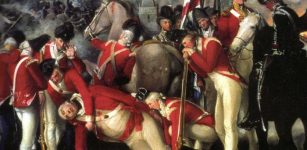 On This Day In History: Irish Rebellion Led By The United Irishmen Against British Rule Begins – On May 24, 1798
News | May 24, 2016
On This Day In History: Irish Rebellion Led By The United Irishmen Against British Rule Begins – On May 24, 1798
News | May 24, 2016 -
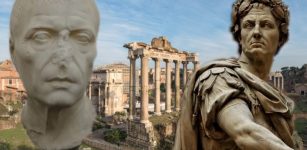 Cato The Younger – Mortal Enemy Of Julius Caesar Was A Man Who Hated Luxury, New Ideas And Was Immune To Bribes
Featured Stories | Apr 17, 2021
Cato The Younger – Mortal Enemy Of Julius Caesar Was A Man Who Hated Luxury, New Ideas And Was Immune To Bribes
Featured Stories | Apr 17, 2021 -
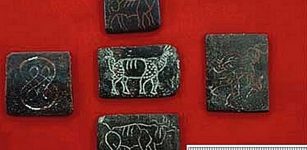 Curious Ancient Copper Plates And The Mystery Of Indus Valley
Artifacts | Oct 24, 2015
Curious Ancient Copper Plates And The Mystery Of Indus Valley
Artifacts | Oct 24, 2015 -
 New Models Shed Light On Life’s Origin
DNA | Feb 13, 2023
New Models Shed Light On Life’s Origin
DNA | Feb 13, 2023 -
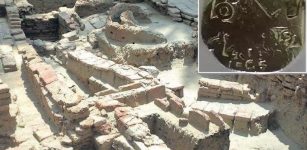 Keeladi Ancient Site Of Tamil Nadu – A Punch-Marked Silver Coin Unearthed
Archaeology | Jul 31, 2021
Keeladi Ancient Site Of Tamil Nadu – A Punch-Marked Silver Coin Unearthed
Archaeology | Jul 31, 2021 -
 A Stone Age Child Buried With Bird Feathers, Plant Fibers And Fur Investigated In Finland
Archaeology | Nov 2, 2022
A Stone Age Child Buried With Bird Feathers, Plant Fibers And Fur Investigated In Finland
Archaeology | Nov 2, 2022 -
 Belobog White God In Everlasting Fight With His Cursed, Evil Counterpart, Chernobog In Slavic Beliefs
Featured Stories | Dec 4, 2017
Belobog White God In Everlasting Fight With His Cursed, Evil Counterpart, Chernobog In Slavic Beliefs
Featured Stories | Dec 4, 2017 -
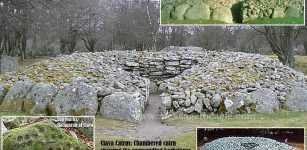 4,000-Year-Old Scottish Clava Cairns Were Built To House Dead
Civilizations | Nov 27, 2018
4,000-Year-Old Scottish Clava Cairns Were Built To House Dead
Civilizations | Nov 27, 2018 -
 What Are The Most Common Misconceptions About Pirates?
Ancient History Facts | Apr 16, 2024
What Are The Most Common Misconceptions About Pirates?
Ancient History Facts | Apr 16, 2024 -
 Why Are Christmas Ghost Stories So Fascinating?
Christmas Traditions | Dec 24, 2019
Why Are Christmas Ghost Stories So Fascinating?
Christmas Traditions | Dec 24, 2019 -
 Strange Ancient Sky Phenomenon – It Was Not A ‘Natural’ Space Object – Scientist Said
Featured Stories | Nov 5, 2019
Strange Ancient Sky Phenomenon – It Was Not A ‘Natural’ Space Object – Scientist Said
Featured Stories | Nov 5, 2019 -
 Kindred Spirits: Why Did The Irish Build A Monument In Honor Of Native Americans?
Ancient History Facts | Oct 22, 2016
Kindred Spirits: Why Did The Irish Build A Monument In Honor Of Native Americans?
Ancient History Facts | Oct 22, 2016 -
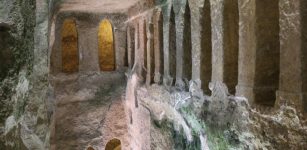 Largest In Europe Underground Church Of Saint-Jean of Aubeterre Built By 12th Century Benedictine Monks
Featured Stories | Feb 12, 2016
Largest In Europe Underground Church Of Saint-Jean of Aubeterre Built By 12th Century Benedictine Monks
Featured Stories | Feb 12, 2016 -
 Archery Technology Emerged In The Americas 5,000 Years Ago – Much Earlier Than Previously Thought
Archaeology | Dec 21, 2023
Archery Technology Emerged In The Americas 5,000 Years Ago – Much Earlier Than Previously Thought
Archaeology | Dec 21, 2023 -
 Evolution Might Stop Humans From Solving Climate Change – Researchers Say
Evolution | Jan 3, 2024
Evolution Might Stop Humans From Solving Climate Change – Researchers Say
Evolution | Jan 3, 2024 -
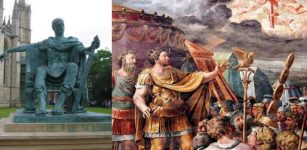 Constantine The Great – Did First Roman Christian Emperor Use Faith For His Own Agenda?
Featured Stories | Aug 8, 2018
Constantine The Great – Did First Roman Christian Emperor Use Faith For His Own Agenda?
Featured Stories | Aug 8, 2018 -
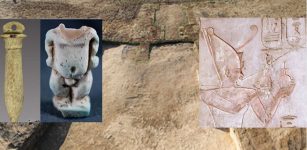 Fragments Of Oldest Pharaonic Military Fortress Unearthed In Egypt’s North Sinai
Archaeology | May 20, 2019
Fragments Of Oldest Pharaonic Military Fortress Unearthed In Egypt’s North Sinai
Archaeology | May 20, 2019 -
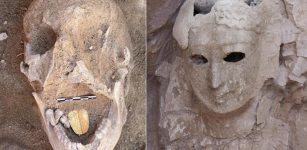 Ancient Egyptian Mummies With Golden Tongues Discovered In Alexandria
Archaeology | Feb 3, 2021
Ancient Egyptian Mummies With Golden Tongues Discovered In Alexandria
Archaeology | Feb 3, 2021 -
 Why Is La Ferrassie Man A Unique And Famous Neanderthal?
Featured Stories | Oct 30, 2023
Why Is La Ferrassie Man A Unique And Famous Neanderthal?
Featured Stories | Oct 30, 2023 -
 On This Day In History: Battle Of Lagos Took Place Between Royal Navy Of Britain and France – On August 19, 1759
News | Aug 19, 2016
On This Day In History: Battle Of Lagos Took Place Between Royal Navy Of Britain and France – On August 19, 1759
News | Aug 19, 2016

